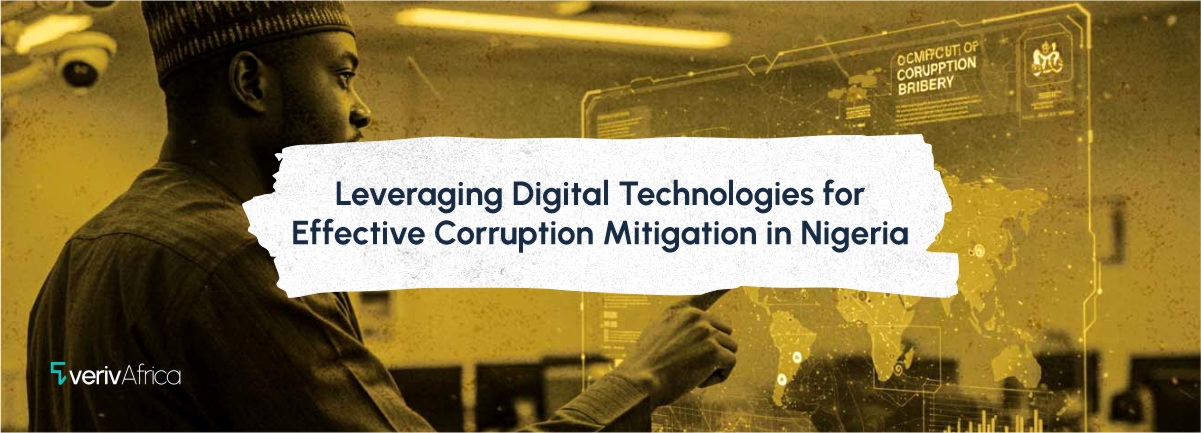Nigeria loses approximately $18 billion annually to corruption, with over 90% of this loss linked to procurement and contract fraud in the public sector. This significantly challenges Nigeria’s socio-economic development, hindering progress in various sectors, impeding economic growth, and eroding public confidence. According to the 2019 Global Corruption Barometer, 44% of Nigerians reported paying bribes, an increase from the bribery payment rate of 43% in 2015.
Source: Transparency International (2024), 0 being highly corrupt and 100 being clean.
The National Bureau of Statistics explained that more than 93% of these bribes were in cash, amounting to over ₦675 billion paid to public officials in 2019 and about 45% paid to speed up processes, with the top public official (police officers) still engaging in analogue operations. The Office of the Head of the Civil Service of the Federation reiterates this, stating that less than 50% of service officials had functional email addresses, less than 40% of ministries' work processes were automated, and less than 60% of government services were available online. These findings highlight the oversight in the adoption of digital technology, which could reduce physical transactions and the prevalence of bribery-seeking and paying behaviour.
Corruption is prevalent in various sectors, including government institutions, public service delivery, health care, and the judiciary. Corruption in Nigeria, which includes embezzlement, bribery, nepotism, vote buying, etc., obstructs foreign direct investment, lowers tax revenues, undermines institutions, and distorts market dynamics. It affects the overall rate of economic growth by diverting cash intended for development projects, public services, and industrial activities. Ultimately, it exacerbates general living conditions and social inequality in society, resulting in lower human capital.
Despite several efforts by anti-corruption agencies to eradicate corruption in Nigeria, corruption lingers due to deficient regulatory frameworks, political interference, limited transparency, and ineffective accountability and auditing mechanisms. Addressing this issue should extend beyond law enforcement and encompass institutional reforms that utilise digital technologies to enhance transparency and accountability. Utilising technology and data analytics within government organisations, such as procurement offices, finance ministries, tax authorities, account offices, and audit offices, can ensure the effective management of public resources. As digital penetration accelerates globally, it has become imperative to explore this transition within the local context.
Exploring Pathways and Strategies for Effective Corruption Mitigation through Digitalisation
The promotion of digital payments and the modernisation of financial management systems can mitigate corruption risks in public finances, as it will minimise the need for cash transactions, thereby reducing the incentives for embezzlement and bribery. Also, this could be instrumental in improving transparency, real-time tracking, and monitoring of public processes and funds. Utilising e-government initiatives and digital platforms can streamline administrative processes, especially government contract procurement procedures, reduce bureaucratic obstacles and minimise opportunities for corruption. An Open Data Initiative will promote the publication of government data related to budgets, procurement, and public services, while also facilitating access to this information for civil society organisations and the media. This will enable the effective monitoring of government activities, the gathering of public feedback, complaints, and suggestions, and ensure citizen participation, ultimately facilitating prompt action against corruption.
Launched in 2019 by the Federal Government, the Open Treasury Portal was designed to promote transparency in public finance by publishing daily payments of ₦5 million and above by MDAs. While it represents a commendable move toward fiscal openness, a 2021 review by BudgIT revealed several limitations, including incomplete data entries, outdated reports, and a lack of enforcement against erring agencies, suggesting that digital tools alone are insufficient without political will and institutional compliance.
Rwanda’s Irembo and Integrated Electronic Case Management System (IECMS), on the other hand, have been instrumental in digitising government processes. It has improved efficiency and accessibility to service delivery, thereby reducing physical interaction, strengthening transparency, especially in procurement processes and limiting the chances of corruption. These contributed to the improvement of Rwanda’s CPI score from 49 in 2014 to 57 in 2024 and the reduction of bribe incidents from approximately 24% in 2016 to about 18% in 2019. Evidence also shows that the digital processing of tax returns lowers tax compliance costs, enhances tax collection, and decreases tax fraud, as seen in Kenya, where the digitalisation of tax systems has reduced interaction between taxpayers and tax administrators, thereby preventing bribery and eliminating opportunities for corruption.
The Nigerian Model
For this transition to yield effective results, it must be backed by legislative mandates. While laws such as the Public Procurement ACT 2007 mandate the use of databases and technology, the issue lies in enforcement. Amendments should be made to mandate real-time uploads and stipulate incentives and penalties for compliance with, or non-compliance from, the adoption of digital systems. To support this effort, partnerships between the government and Private bodies such as FinTech companies are essential, not only for developing digital platforms but also for ensuring compliance with data-sharing regulations. Rwanda’s Irembo platform provides a valuable model, demonstrating how public-private collaboration can drive digital service delivery while ensuring data integrity.
This transition also requires investment in infrastructure, such as reliable power and internet supplies, as well as software development. Also, addressing the digital literacy gap affecting over 50% of Nigerians by training both public officials and citizens in the use of modern technologies and principles of data governance is essential. Importantly, public institutions must also establish robust IT protocols and develop digital competencies to help safeguard infrastructure, protect sensitive data, and prevent unauthorised access.
Key Considerations When Adopting Digital Technologies
While advocating for the digitalisation of public services, it is essential to address digital vulnerabilities, particularly cyber threats and attacks. Strengthening cybersecurity infrastructure must therefore accompany the adoption of new technologies to ensure the resilience and integrity of Nigeria’s digital transformation. Tackling corruption in Nigeria demands sustained government commitment and political will. By automating public service delivery, the country can enhance transparency, accountability, and inclusiveness, laying the foundation for sustainable development and improved well-being for all citizens.










